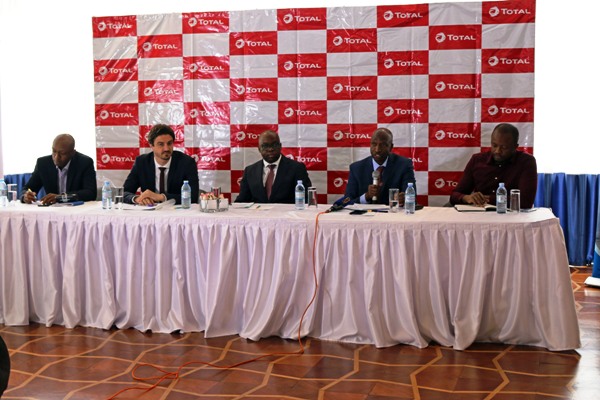By Aloysious Kasoma
Uganda is in the final stages of constructing the oil pipeline, but has a deficit of 1,500 qualified welders to handle the project. These are required to fulfill the local content laws. The required welders must have an American Welder’s Certificate and a wealth of experience.
The project is expected to create 15,000 jobs during its execution and after completion it will employ between 1,000 to 2,000 people.
It is still not certain when exactly the project will commence, but officials say as soon as the welders are available, the project will kick off. Total E&P Uganda on Tuesday launched a fully paid training in which 200 welders will develop a domestic pool of internationally certified welders of the American Welding Society Standard.
Total with partnership with GIZ and Q – Sourcing and the Petroleum of Uganda will empower Ugandans within the Albertine Region to participate in the Oil & Gas Sector. According to Total E&P Uganda General Manager, Adewale Fayemi, the training is aimed at improving the employ-ability of Ugandans from the Albertine region and East African Crude Oil Pipeline areas.
“The training will be held over the course of at least 24 weeks and will initially benefit 200 welders from Nwoya, Masindi, Nebbi, Buliisa and Hoima, as well as the districts along the pipeline route including Kakumiro, Kyankwanzi, Mubende, Gomba, Sembabule, Lwengo and Kyotera,” Fayemi said while addressing journalists at
Golden Tulip Hotel in Kampala.
He added: “In all its operations worldwide, Total considers national content as key for the success of its operations and Total E&P Uganda is no exception. Therefore, our plan is to maximize the use of local manpower, local goods and service providers. This indeed is in line with the National Content regulations.”
Ernest Rubondo, the Executive Director of the Petroleum Authority of Uganda (PAU) said that the move is required to assist and help the private sector in the national content aspect.
“It is a very important aspect on two fronts; the ownership development and make sure the people you choose fall in the national content aspect,” he advised.
The oil sector is expected to attract US$20bn into the country in the next few years. During the development phase, a lot of technicians will be needed for the project. It is therefore essential to train and certify technicians such as welders to enhance their knowledge and skills required to not only meet the demands of the project but also ensure
that the highest standards of safety are considered.
“Due to the highly technical nature of the industry, quality and safety cannot be compromised,” Rubondo said.
The training will be conducted by two Ugandan Companies, Q-Training also known as the Assessment and Skilling Centre (TASC) and E360 Group Ltd.
Two central locations have been identified where training will be conducted ; Buliisa district for candidates from the Albertine districts and Lwengo district for candidates from the pipeline
districts. The trainers will perform technical training and certification of candidates up to 2G and 4G coded welding levels in line with the industry standards and health, Safety and environment
training among others. Following the training, Total will ensure that the certified welders are taken on in preparation for the development phase of the project.
According to Patrick Mbonye, the Managing Director of Q – Sourcing in charge of training said applications to the training will be made through radio advertisements on local stations, vocational training institutes, District officials and local government offices.
“The pipeline will follow different types of terrain, if we have Ugandans who can do this welding for the pipeline, we can say we are preparing for local content,” he said.
He said the criteria for this particular training will be a residential proof, vocational certificate, experience of 2 to 3 years in welding and ages between 21 to 34 years will qualify and after the training, they will receive a certificate from the American Welder’s Certificate.
The oil pipeline will start in Buseruka sub-county, Hoima District, in Uganda’s Albertine Region and tt will travel in a general south-easterly direction to pass through Lwengo, Bukoba in Tanzania, loop around the southern shores of Lake Victoria, continue through Shinyanga and Siginda, to end in Tanga, distance of approximately
1,445 kilometres .
The pipeline is planned to have a capacity of 216,000 barrels of crude oil per day. It will be 24 inches (61 cm) in diameter and Uganda will pay Tanzania US$12.20 for every barrel flowing through the pipeline.






I appreciate your efforts. Am interested in the training and particularly the job since I have experience of over 3 years in arc welding. Am a 6G welder from Kenya.
Am a Ugandan from masindi I have level2diploma in welding and3,4&6g also in welding and have been sponserd by you company total and cnooc end I have no job how can u help me so that iWork with u
Thank you may God bless you
Hello am 6g welder,,,, Kenyan citizen and I would like to work with your company …. with experience in oil and gas industry
Thank you in advance
How can i get a welding job on uganda tanzania pipeline
I really appreciate all your efforts to strengthen we the youth in the Albertine region especially me in particular as a welder in Nwoya district. We really deserve this opportunity